


Heart-healthy fats, such as those found in avocados, nuts, seeds, and fatty fish like salmon, are essential for boosting cardiovascular health. They play a crucial role in lowering cholesterol levels and reducing the risk of cardiovascular disease, which is a concern for many. By incorporating these nutritious fats into your diet, you can experience significant health improvements, especially as you age. These fats not only enhance your overall well-being but also reduce inflammation and support cognitive function.
Have you considered how these dietary changes could positively impact your life? Embracing heart-healthy fats can be a simple yet effective way to take charge of your health. Remember, it’s never too late to make choices that benefit your body and mind. Your journey towards better health can be supported by these small, manageable changes that truly make a difference.
Incorporating heart-healthy fats into one’s diet can truly transform cardiovascular health, particularly for our elderly loved ones who face a higher risk of heart disease. These beneficial fats, found in nourishing foods like avocados, nuts, and fatty fish, not only help to lower cholesterol levels but also enhance overall well-being by reducing inflammation and supporting cognitive function. Yet, amidst the many dietary choices available, how can individuals discern which fats genuinely promote heart health and effectively weave them into their daily meals?
It's understandable to feel overwhelmed by the plethora of options. However, with a little guidance and care, it becomes easier to make informed choices that support heart health. By focusing on incorporating these healthy fats, we can take meaningful steps toward a healthier lifestyle together. Remember, you are not alone in this journey; seeking support and information is a positive action towards improving your health.
At Amavita Heart and Vascular Health, we truly understand that your dietary choices are vital for maintaining cardiovascular health, especially for our elderly patients. By including heart healthy fats in your diet, you can significantly lower cholesterol levels and reduce the risk of cardiovascular illness. Research shows that swapping out saturated fats for polyunsaturated and monounsaturated fats can lead to a remarkable 30% reduction in cardiovascular disease (CVD) risk, as demonstrated by randomized controlled trials. This is particularly important, given that cardiovascular illness is the leading cause of fatalities among the elderly, accounting for about one in three deaths in the U.S.
Heart healthy fats, such as those found in avocados, nuts, seeds, and fatty fish like salmon, not only support cardiovascular wellness but also provide essential nutrients that help with the absorption of vitamins, including vitamin D. Many seniors face deficiencies in this crucial vitamin, especially during the winter months. Cardiologists emphasize that heart healthy fats can enhance overall well-being, reduce inflammation, and bolster cognitive function, which is vital as memory loss and cognitive decline become more common with age.
Successful dietary changes have shown that seniors who embrace a diet rich in heart healthy fats often experience improved mobility and comfort, particularly those dealing with inflammatory conditions like arthritis. By making gradual adjustments—such as substituting butter with olive oil or opting for nuts instead of processed snacks—you can enhance your cardiovascular health and overall quality of life.
Incorporating these dietary changes can be quite simple. For example, adding a serving of nuts or seeds to your meals or choosing whole grains over refined options can create a significant impact. As Dr. Caroline M. Apovian wisely states, 'You need sufficient fat in your diet for optimal well-being.' By prioritizing heart healthy fats that benefit your cardiovascular system, you can take proactive steps towards improving your well-being and enjoying a longer, healthier life.
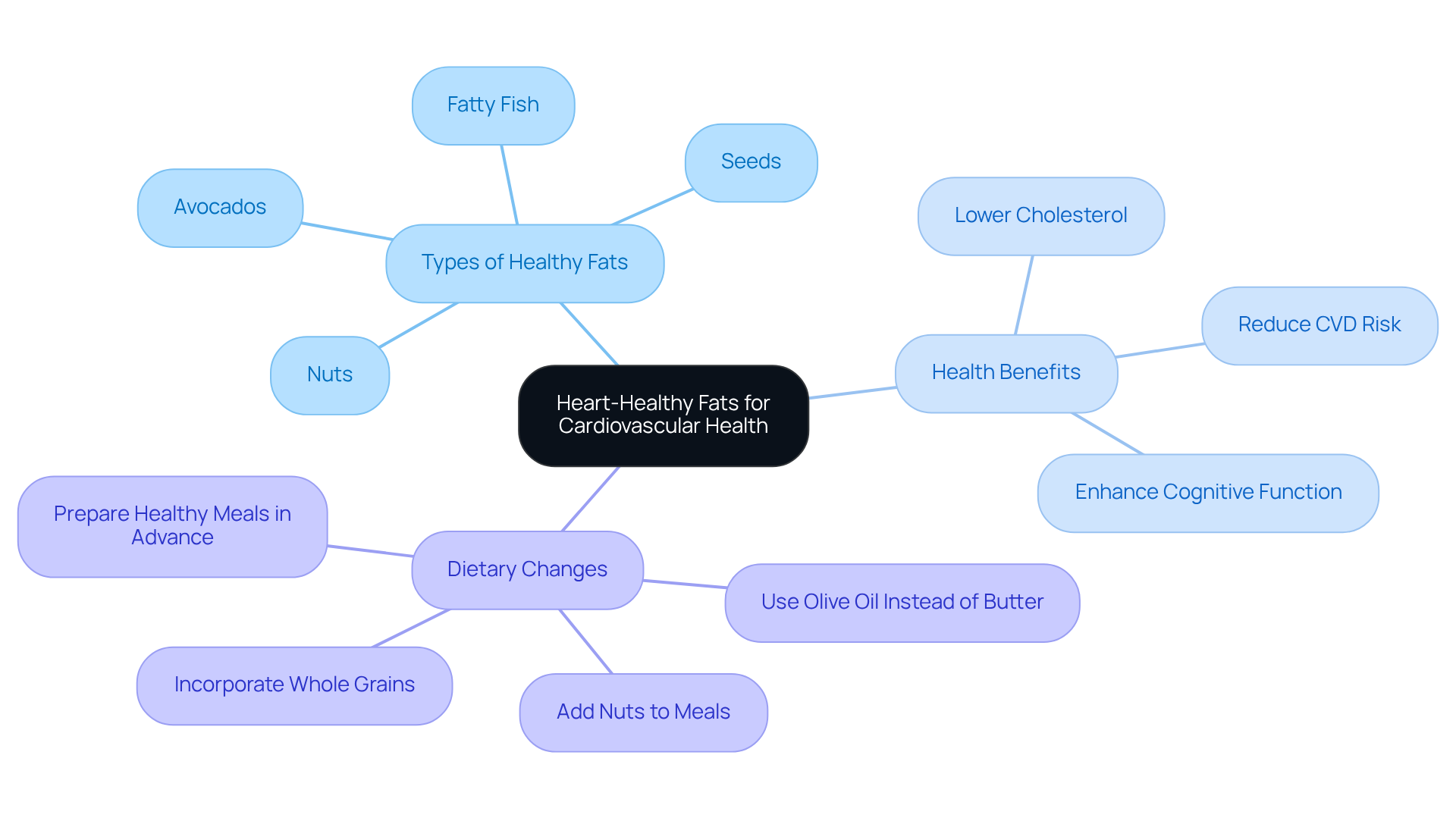
Olive oil, a vital part of the Mediterranean diet, is celebrated for its high levels of heart healthy fats, which are essential for supporting heart health. Research consistently shows that including olive oil, which is rich in heart healthy fats, in your diet can help lower levels of low-density lipoprotein (LDL) cholesterol, often called 'bad' cholesterol, while also increasing high-density lipoprotein (HDL) cholesterol, known as 'good' cholesterol. This dual effect is crucial for maintaining a healthy lipid profile and reducing the risk of heart diseases, especially through the consumption of heart healthy fats, particularly for those with diabetes, hypertension, or a family history of heart conditions.
In addition to this, olive oil is packed with antioxidants that play a significant role in reducing inflammation in the body. These antioxidants, especially polyphenols, contribute to the oil's protective benefits against oxidative stress, a key factor in heart issues and other chronic conditions. At Amavita, we utilize advanced imaging capabilities, and incorporating olive oil into dietary recommendations can be an integral part of a personalized care plan for patients seeking effective management of their heart health.
Incorporating olive oil, a source of heart healthy fats, into your daily meals can be both enjoyable and beneficial. Whether drizzled over salads, used in cooking, or served as a dip, olive oil not only enhances flavor but also provides heart healthy fats that support cardiovascular health. Research indicates that individuals who regularly use olive oil, which contains heart healthy fats, experience improved cholesterol levels and a reduced risk of heart-related incidents, making it a wise choice for anyone looking to enhance their overall well-being. Remember, taking small steps in your diet can lead to significant improvements in your health, and we are here to support you on this journey.
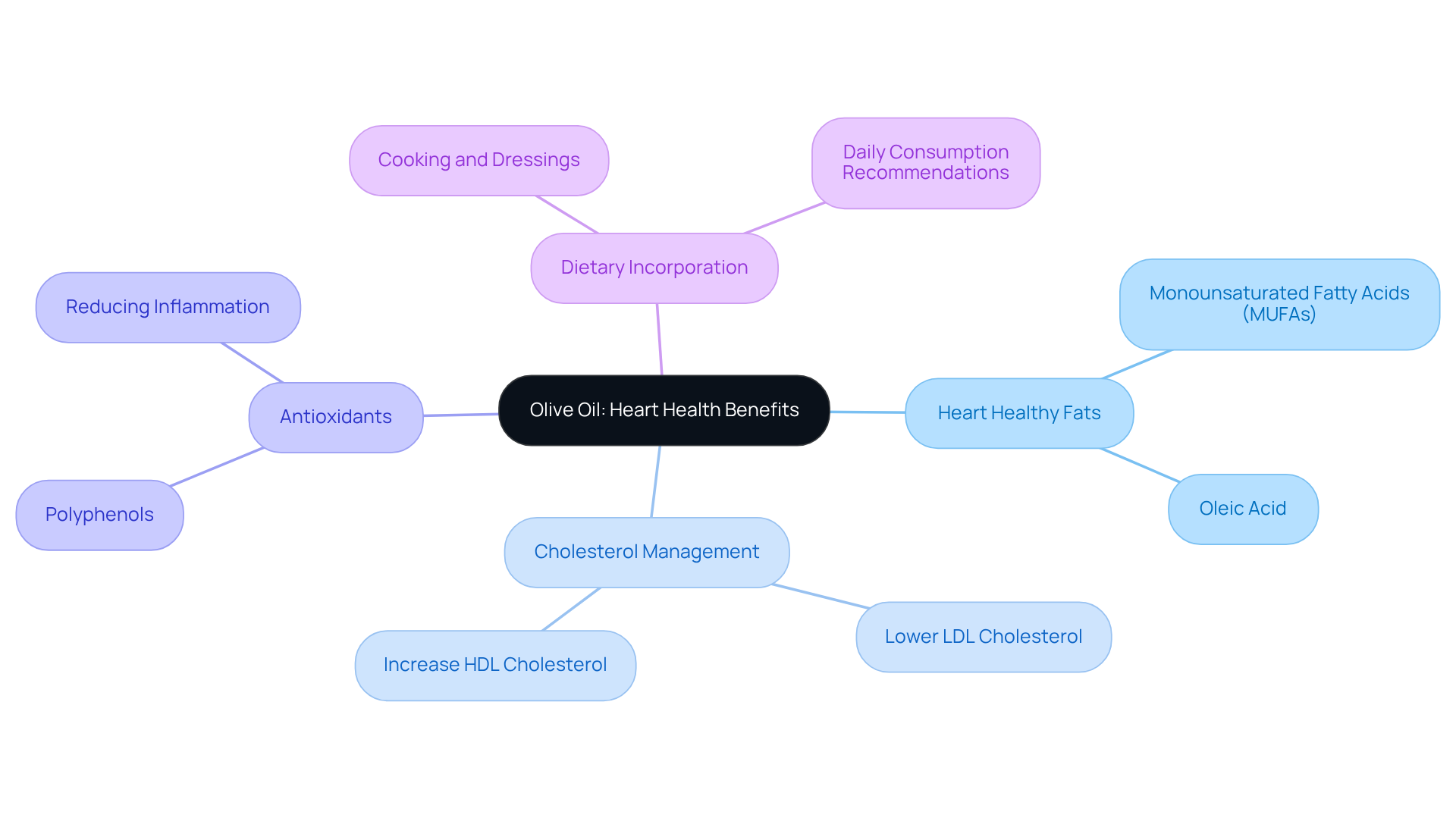
Avocados are not only a delightful addition to your meals but also a treasure trove of nutrients that can significantly support your heart health, particularly for those at higher risk due to conditions like diabetes and hypertension. These creamy fruits are rich in heart healthy fats, as well as fiber, vitamins, and minerals, all of which play an important role in promoting cardiovascular well-being. Did you know that research shows individuals who enjoy at least two servings of avocados each week can reduce their risk of cardiovascular issues by 21% compared to those who consume them infrequently? Furthermore, simply swapping out half a serving of butter, cheese, margarine, or processed meats for avocado each day can lower heart disease risk by up to 22%?
Incorporating avocados into a balanced diet can lead to significant reductions in LDL cholesterol levels, especially when they replace sources of saturated fats. Additionally, the potassium and magnesium found in avocados help regulate blood pressure, while the fiber content supports digestive health and aids in blood sugar control. This makes avocados a wonderful choice for enhancing your meals with heart healthy fats, whether you add them to salads, blend them into smoothies, or use them as a creamy spread.
By including avocados in your diet, you can complement the advanced cardiovascular care provided by Amavita, ensuring a comprehensive approach to your well-being. Think about how easy it could be to replace butter or mayonnaise with avocado in your meals to support your heart health. You deserve to feel your best, and small changes like these can make a meaningful difference.
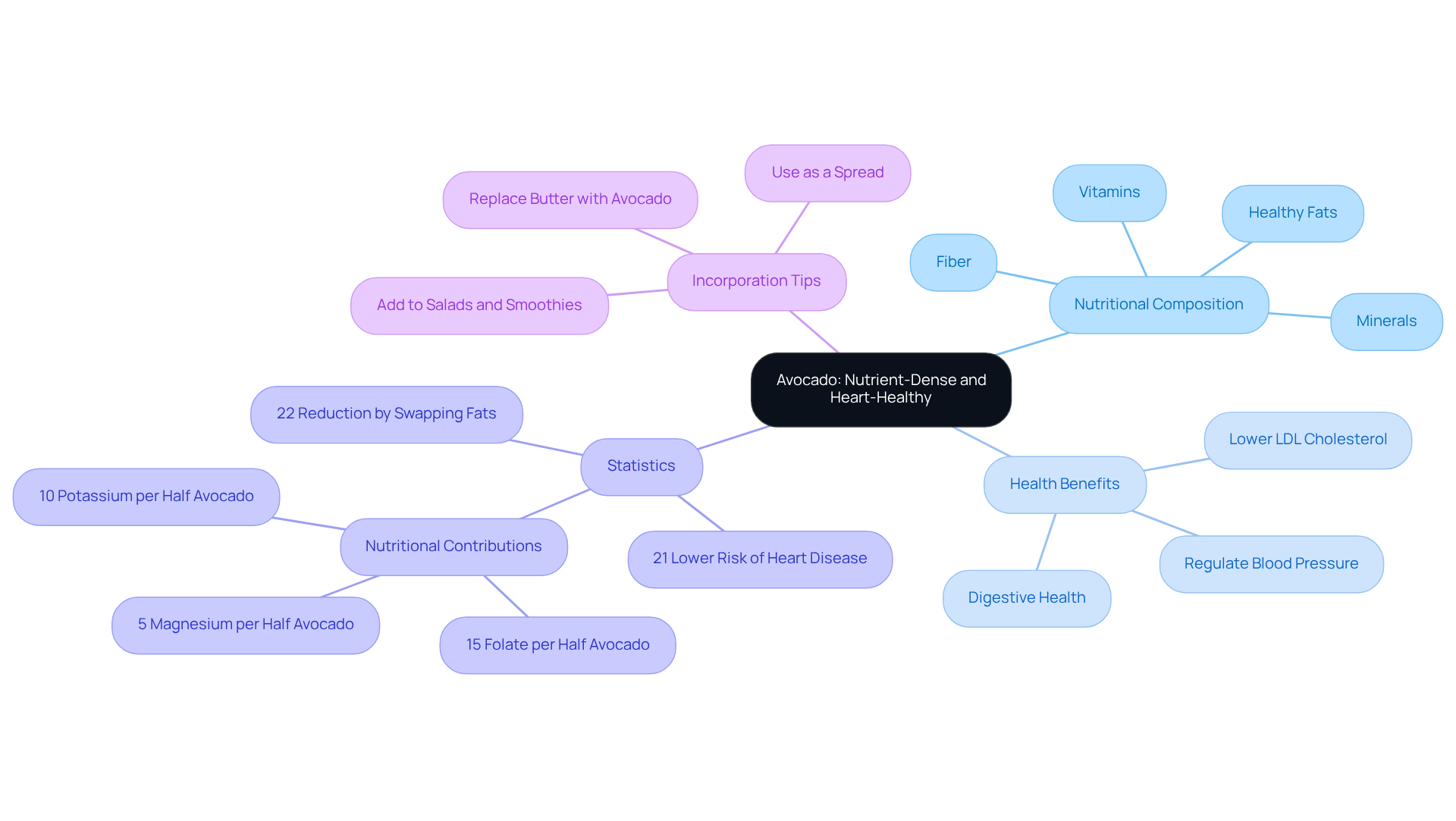
Salmon is a wonderful source of heart healthy fats and omega-3 fatty acids, which play a crucial role in maintaining cardiovascular health, especially for those at higher risk due to conditions like diabetes and hypertension. Heart healthy fats are essential as they help reduce inflammation, lower blood pressure, and decrease triglycerides, all of which are important components of a comprehensive care plan. Regularly enjoying fatty fish like salmon, known for their heart healthy fats, is associated with a lower risk of cardiovascular issues, making it a valuable dietary choice for individuals receiving care at Amavita.
The American Heart Association suggests that you consume fish that are rich in heart healthy fats at least twice a week to fully reap these benefits. Consider including salmon in your meals at least twice weekly, whether it’s grilled, broiled, or baked, as these cooking methods are healthier alternatives to frying. It’s also important to be aware of potential mercury concerns related to fish consumption, particularly for those who are more vulnerable. This simple dietary adjustment, which incorporates heart healthy fats, can greatly enhance your cardiovascular well-being and complement the advanced imaging and treatment options available at Amavita.
How might incorporating salmon into your diet make you feel? Remember, these small changes can lead to significant improvements in your health. We’re here to support you every step of the way.
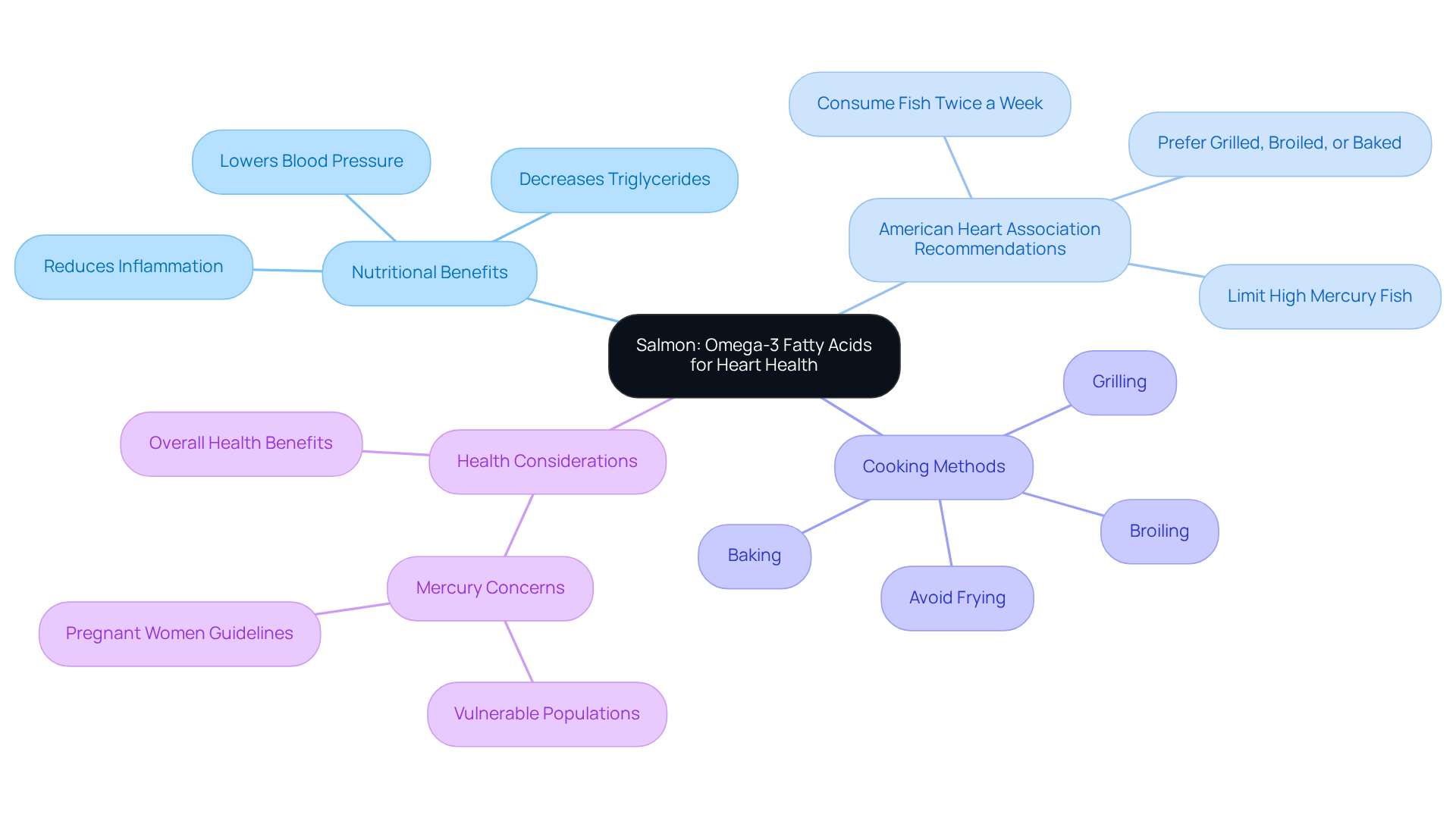
Nuts, such as almonds, walnuts, and pistachios, are not just tasty; they are also packed with healthy fats, fiber, and protein, making them a wonderful choice for heart-healthy snacking. Have you considered how consistent nut intake can benefit your heart? Studies show that regularly enjoying nuts can significantly lower cholesterol levels, particularly LDL cholesterol, which is linked to cardiovascular issues. A small handful of nuts can serve as a satisfying and nutritious snack, contributing to better artery health and reducing inflammation associated with heart problems.
For our elderly patients, especially those at higher risk for heart disease—like those with diabetes, hypertension, or a family history—incorporating nuts into a heart-healthy diet can be a valuable addition to the comprehensive care provided by Amavita. This care includes advanced imaging and thorough evaluations tailored to meet each patient’s unique needs. To reap the benefits of nuts, it’s recommended to enjoy 4 to 6 portions of unsalted nuts weekly. Additionally, nuts are rich in L-arginine, which may help lower blood pressure and improve cholesterol levels.
However, because nuts are calorie-dense, moderation is key. It is advisable to limit servings to about ¼ cup. Including a variety of nuts, which are rich in heart healthy fats, in your diet not only supports cardiovascular function but also provides essential nutrients that promote overall well-being. At Amavita, we are here to support you every step of the way, ensuring that your health journey is both comforting and empowering.

Chia seeds, though small, are powerful allies in providing heart healthy fats that nurture your heart health. Rich in omega-3 fatty acids, fiber, and antioxidants, these little seeds can truly enhance your diet. By simply adding 1-2 tablespoons of chia seeds to your smoothies, yogurt, or oatmeal, you can significantly boost your intake of essential nutrients that support cardiovascular function.
Have you considered how the omega-3s in chia seeds can help? Research shows they play a vital role in managing cholesterol levels, lowering LDL cholesterol and triglycerides while increasing HDL cholesterol. This balance is crucial for reducing the risk of heart-related issues.
Moreover, the soluble fiber in chia seeds creates a gel-like substance in your stomach, which not only aids digestion but also helps you feel fuller, making it easier to manage your weight. Imagine feeling satisfied while also caring for your heart!
Regularly including chia seeds in your diet can lead to improved cardiovascular health and overall well-being in just 14 days. This establishes them as a valuable addition to any diet that includes heart healthy fats for heart wellness.
Remember, taking small steps like these can make a significant difference in your health journey, and you are not alone in this endeavor.
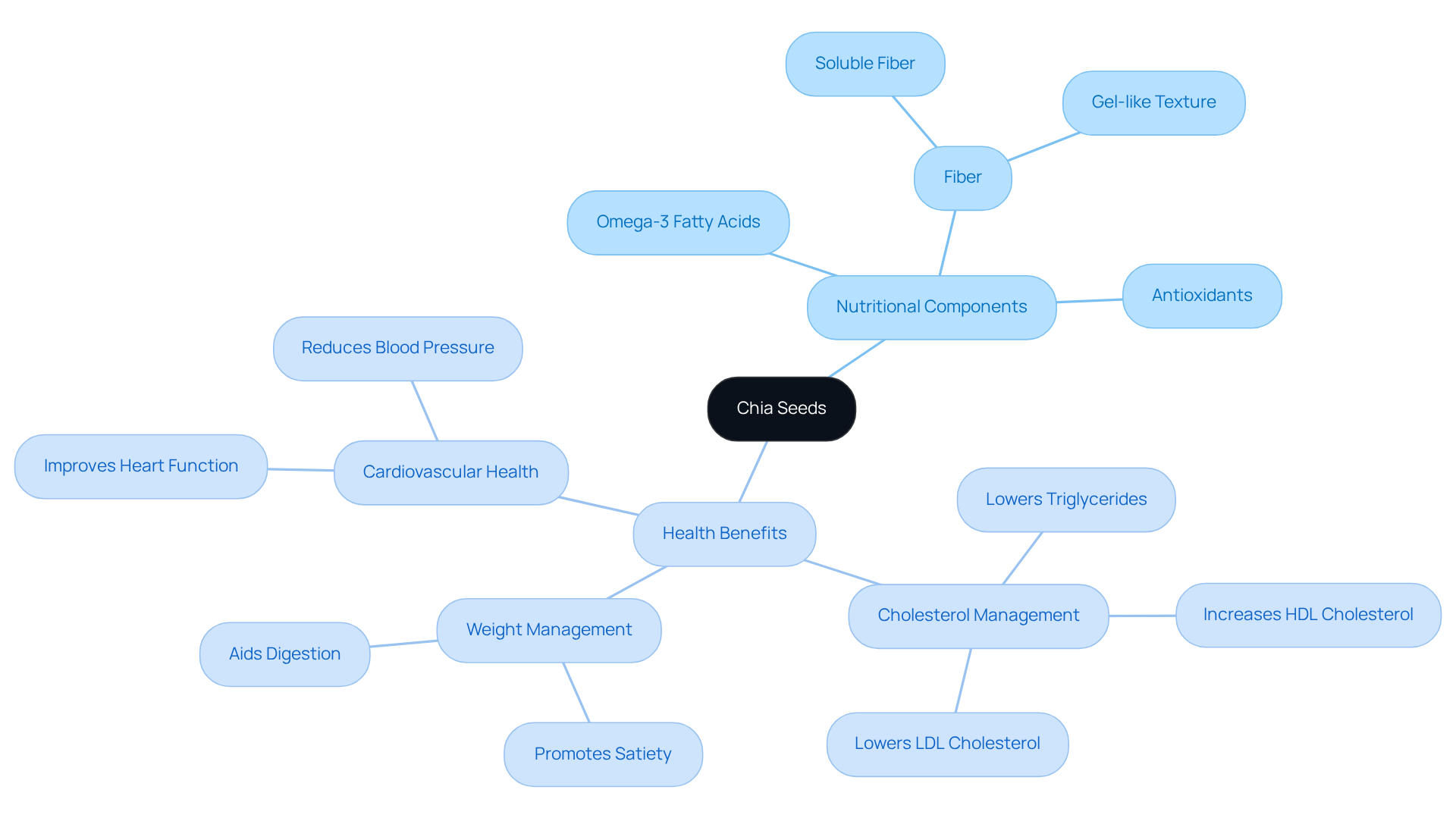
Flaxseeds are a wonderful source of omega-3 fatty acids and dietary fiber, making them a valuable addition of heart healthy fats to any diet that promotes heart health, especially for those at high risk. Have you considered how these tiny seeds can effortlessly enhance your meals? You can easily incorporate them into smoothies, baked goods, or even sprinkle them over salads for that extra nutritional boost. Ground flaxseeds are particularly beneficial, as they are more readily digested by your body, maximizing their advantages.
Research shows that consistent intake of flaxseeds, known for their heart healthy fats, can lead to slight decreases in LDL cholesterol and triglycerides, which is essential for maintaining cardiovascular wellness. To enjoy these benefits, aim for one to two tablespoons of ground flaxseeds each day.
However, it's important to consult with your healthcare professional before starting flaxseed, especially if you are on blood pressure medications, as flaxseeds may interact with certain medications. This simple dietary adjustment that includes heart healthy fats can significantly enhance your cardiovascular wellness and overall well-being, complementing the advanced imaging and thorough assessments provided at Amavita Heart and Vascular Wellness.
Remember, you are not alone on this journey; we are here to support you every step of the way.

Coconut oil is well-known for its medium-chain triglycerides (MCTs), which can provide a quick source of energy and are linked to various health benefits. However, it’s important to recognize that coconut oil is also high in saturated fat, containing about 90% saturated fatty acids. This can lead to elevated LDL cholesterol levels, a significant risk factor for cardiovascular disease. Therefore, moderation is essential when considering the inclusion of coconut oil in your diet, particularly for those with conditions such as diabetes or hypertension. While it can be used occasionally for cooking or baking, it is advisable to prioritize heart healthy fats such as olive or avocado oil for daily use.
Have you ever thought about how your daily choices can impact your heart health? Studies indicate that Americans who consume at least one-and-a-half teaspoons of olive oil daily, a source of heart healthy fats, have a lower risk of cardiovascular disease compared to those who do not include it in their diets. This approach not only allows you to enjoy the unique benefits of coconut oil but also supports your overall cardiovascular well-being. The American Heart Association recommends caution with coconut oil due to its potential to raise LDL cholesterol levels, which can increase the risk of atherosclerosis and heart disease.
At Amavita Heart and Vascular Wellness, we understand that navigating dietary choices can be overwhelming. That’s why we emphasize personalized dietary recommendations as part of our comprehensive care plans. Our goal is to ensure that you receive tailored advice that aligns with your specific wellness needs. Through advanced imaging methods and therapies, we are dedicated to assisting high-risk patients in effectively managing their cardiovascular health. Remember, you are not alone on this journey; we are here to support you every step of the way.
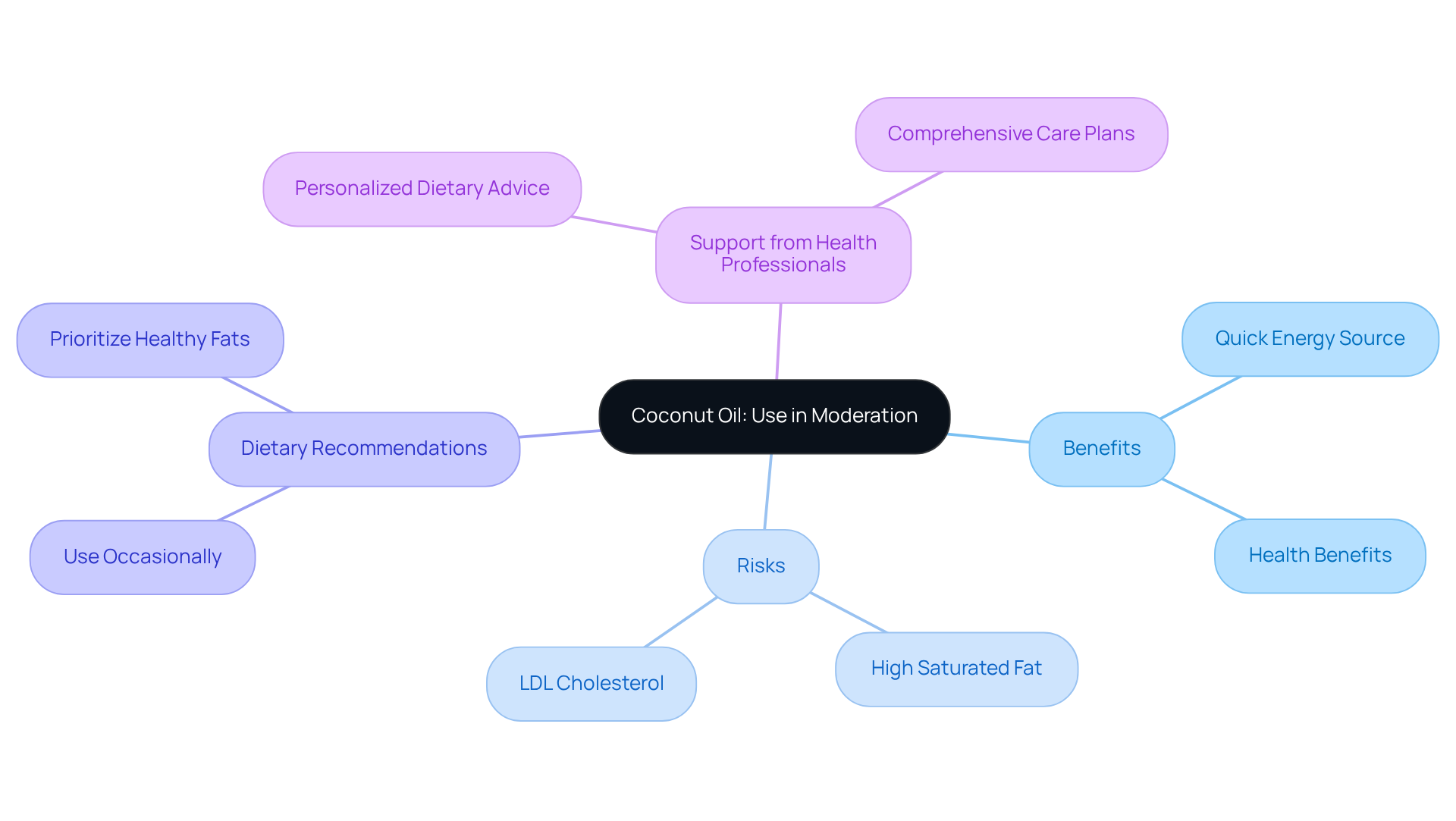
Dark chocolate, especially those varieties with high cocoa content, can be a delightful addition to your diet. It's rich in flavonoids and heart healthy fats, which play a significant role in supporting your cardiovascular health. Research suggests that these compounds can help lower blood pressure and reduce inflammation, offering you a gentle way to care for your heart. Did you know that enjoying 1 to 3 ounces of dark chocolate daily has been linked to a lower risk of coronary heart disease and stroke? In fact, studies indicate that those who indulge in chocolate regularly tend to have lower blood pressure levels compared to those who do not.
Moreover, dark chocolate can aid in lowering bad cholesterol (LDL) while boosting good cholesterol (HDL) due to its heart healthy fats. A small piece can serve as a satisfying treat, providing essential nutrients like:
However, it’s important to be mindful of portion sizes, as too much chocolate may lead to increased sugar intake. Aim for dark chocolate with at least 60% cocoa content to enjoy its benefits while keeping added sugars in check. Remember, moderation is key; limiting your chocolate intake to no more than 3 ounces (85 grams) a day can help maintain a balanced diet.
As nutritionist Staci Gulbin wisely notes, "Dark chocolate owes much of its nutritional value to its high levels of polyphenol antioxidants, such as flavonoids and proanthocyanins, which have anti-inflammatory and vascular-protective effects." This is a wonderful reminder that caring for your heart can be enjoyable. If you have any concerns about your diet or health, please don't hesitate to reach out for support. You're not alone in this journey.
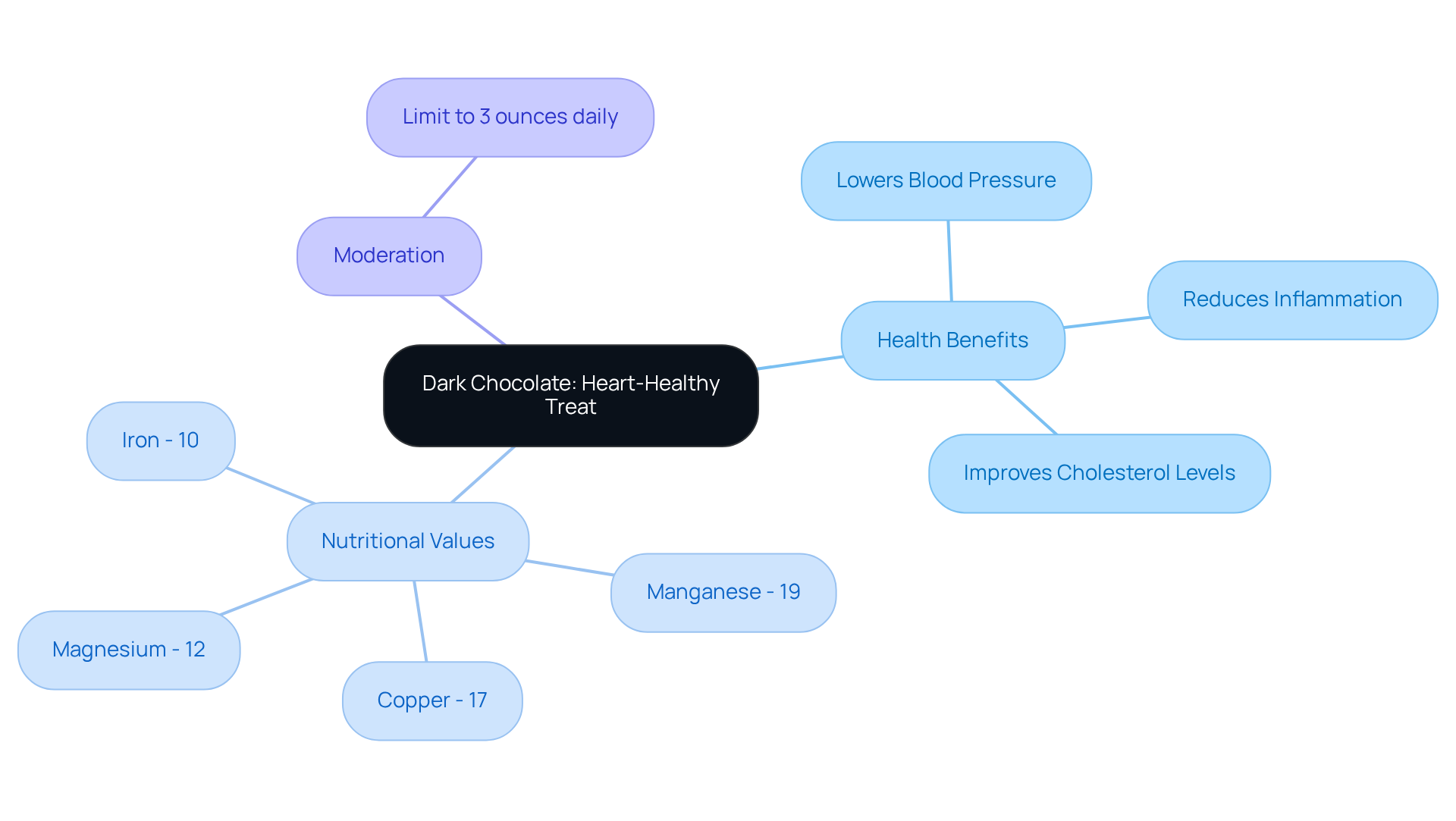
Avocado oil is a wonderful cooking oil that offers a wealth of benefits. It is rich in heart healthy fats and antioxidants, making it a nutritious option for your kitchen. With its high smoke point, avocado oil is perfect for various cooking methods, such as frying and roasting, all while preserving its nutritional goodness. Have you considered how adding avocado oil to your meals could help lower harmful cholesterol levels? Research shows that it may also reduce the risk of atherosclerosis, heart attacks, and strokes, contributing to better cardiovascular health.
Moreover, avocado oil plays a crucial role in enhancing the absorption of fat-soluble vitamins from other foods. For instance, adding it to a salad can increase the absorption of carotenoids by an impressive 4.3 to 17.4 times compared to a salad without any fat. To enjoy these benefits, think about incorporating avocado oil into your dressings, marinades, or while sautéing vegetables. It can also serve as a healthy substitute for butter and seed oils, making it easy to include heart healthy fats in your heart-healthy diet.
At Amavita Cardiovascular and Vascular Wellness®, we believe that thoughtful dietary choices, like adding avocado oil, can complement our advanced cardiovascular care services. This can significantly enhance your overall wellness strategy. Remember, as Union Health reminds us, 'Eating avocados and heart health go hand in hand.' We are here to support you on your journey to better health.
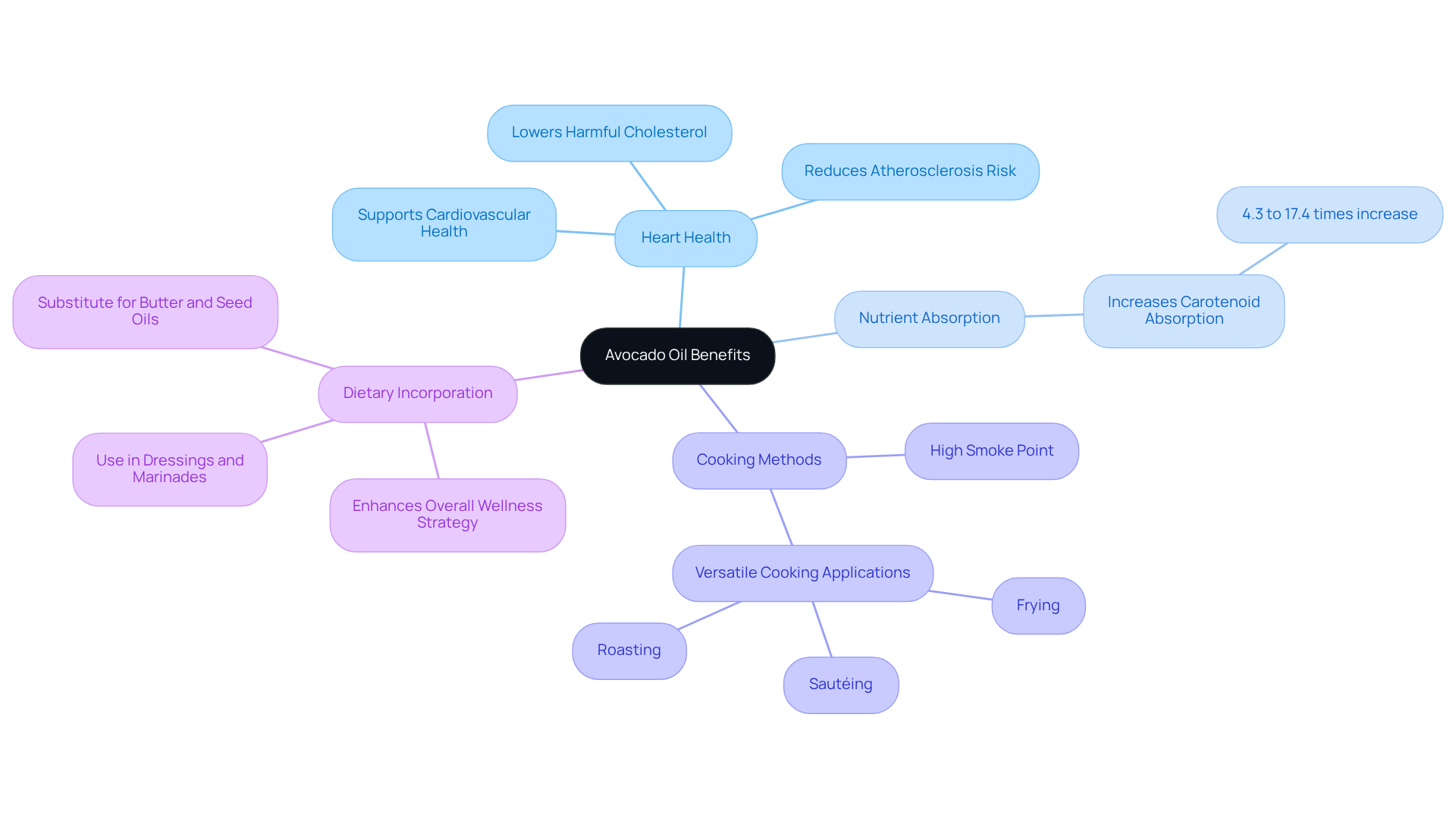
Incorporating heart-healthy fats into your diet is not just beneficial—it's essential for promoting cardiovascular health, especially for seniors. By replacing saturated fats with healthier options like monounsaturated and polyunsaturated fats, you can significantly lower your risk of cardiovascular diseases. This dietary shift not only supports your heart health but also enhances your overall well-being, making it a crucial consideration for anyone seeking to improve their quality of life.
Consider the various sources of heart-healthy fats available to you:
Each of these foods offers unique benefits, from lowering bad cholesterol levels to reducing inflammation and enhancing nutrient absorption. Simple dietary changes, such as using olive oil instead of butter or adding nuts to your meals, can lead to substantial improvements in your heart health and overall vitality.
Ultimately, embracing heart-healthy fats is a proactive step toward better cardiovascular health. By making informed dietary choices and gradually incorporating these beneficial fats into your daily meals, you can take charge of your health journey. Remember, whether through personalized dietary recommendations or support from healthcare providers, prioritizing your heart health is not just a choice—it's a pathway to a longer, healthier life. You deserve this care and attention, and every small step counts towards a brighter future.
Why are heart-healthy fats important for cardiovascular health?
Heart-healthy fats can significantly lower cholesterol levels and reduce the risk of cardiovascular illness. Research indicates that replacing saturated fats with polyunsaturated and monounsaturated fats can lead to a 30% reduction in cardiovascular disease risk.
What types of foods contain heart-healthy fats?
Foods rich in heart-healthy fats include avocados, nuts, seeds, and fatty fish like salmon. These foods also provide essential nutrients that aid in vitamin absorption.
How can heart-healthy fats benefit elderly patients specifically?
For elderly patients, heart-healthy fats can enhance overall well-being, reduce inflammation, and support cognitive function, which is crucial as cognitive decline can become more prevalent with age.
What dietary changes can seniors make to incorporate more heart-healthy fats?
Seniors can make gradual adjustments, such as substituting butter with olive oil or choosing nuts instead of processed snacks. Adding nuts or seeds to meals and opting for whole grains over refined options can also help.
What is the role of olive oil in a heart-healthy diet?
Olive oil is rich in monounsaturated fats and antioxidants, which can lower LDL (bad) cholesterol and increase HDL (good) cholesterol, thereby maintaining a healthy lipid profile and reducing heart disease risk.
How can individuals incorporate olive oil into their meals?
Olive oil can be drizzled over salads, used in cooking, or served as a dip, enhancing flavor while providing heart-healthy fats that support cardiovascular health.
What are the health benefits of consuming avocados?
Avocados are nutrient-dense, rich in heart-healthy fats, fiber, vitamins, and minerals. They can lower LDL cholesterol levels and help regulate blood pressure, making them beneficial for cardiovascular health.
How often should one consume avocados for heart health benefits?
Research suggests that enjoying at least two servings of avocados each week can reduce the risk of cardiovascular issues by 21% compared to infrequent consumption.
What small dietary changes can support heart health?
Simple changes like replacing butter or mayonnaise with avocado and incorporating heart-healthy fats into meals can lead to significant improvements in heart health and overall well-being.